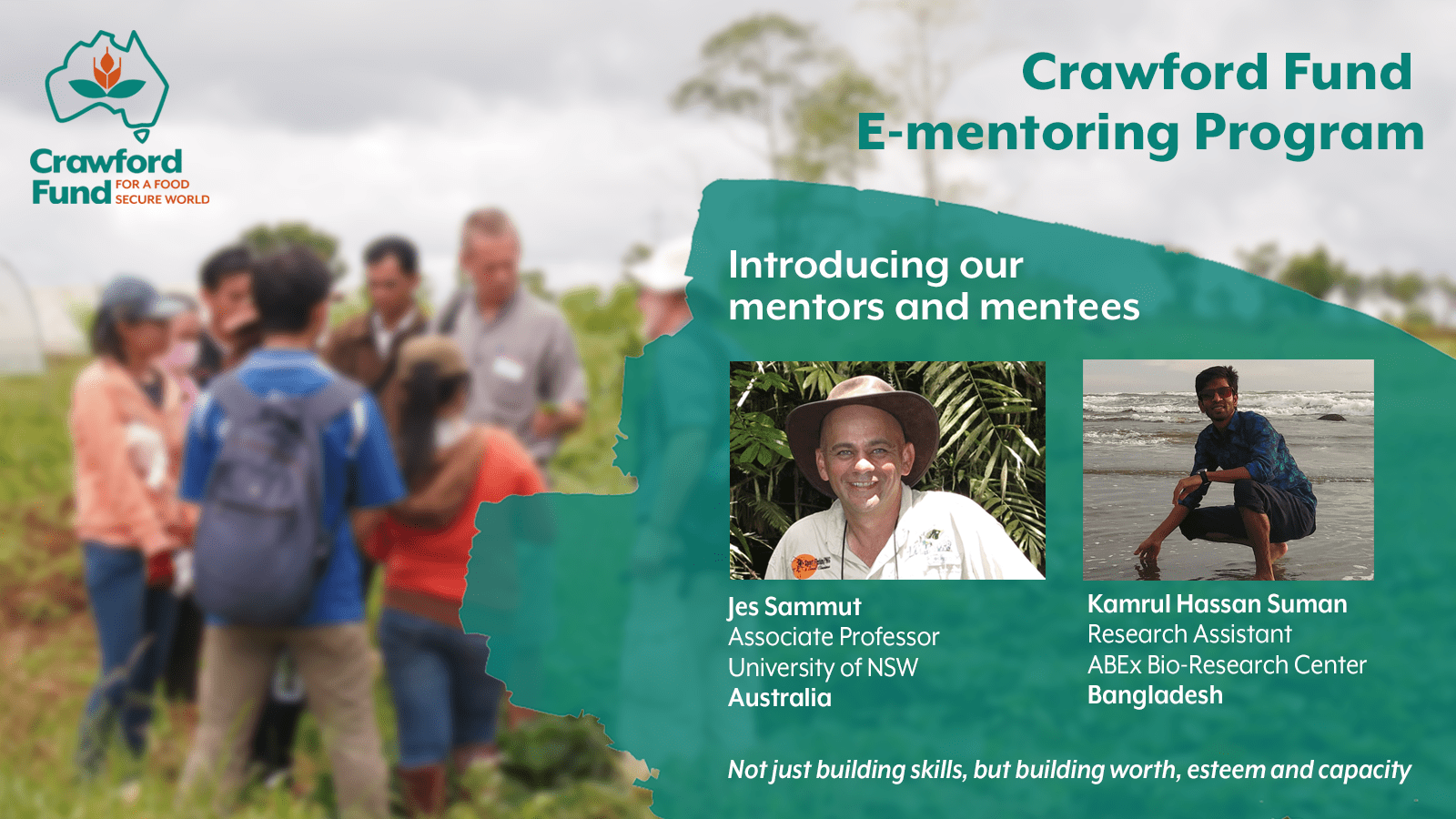

Not just building skills, but building worth, esteem and capacity
September 22, 2021

Late last year we announced our first group of e-mentors and e-mentees as part of our new E-mentoring Program. This program was launched to ensure that, despite COVID-19 and its travel and life restrictions, we could continue to help develop the technical and organisational skills and expertise of agricultural researchers, scientists and policy makers in developing countries.
This program builds on the success of our long term existing Mentoring Program, which has seen face-to-face interaction in overseas countries, backed up by electronic contact, and our conference scholar mentoring program, matching young NextGen researchers with experienced Australians who attend our conference.
We hope that these e-connections not only deliver positive and targeted skill-sharing outcomes, but also enduring connections between the Crawford Fund, the volunteering mentors and their mentees, and the institutions and countries involved.
We now present our latest e-mentoring pair reflecting on their experience, Associate Professor Jes Sammut, from the University of New South Wales and his e-mentee Kamrul Hassan Suman, Research Assistant-Environment & Aquatic Biology division, ABEx Bio-Research Center, Bangladesh.
You can also read earlier reflections from our e-mentors in Australia and their e-mentees in Bhutan, Fiji the Philippines, Ghana, Malaysia and the Philippines and Malaysia again!
E-MENTOR/E-MENTEE PAIRING – Jes Sammut (Australia) and Kamrul Hassan Suman (Bangladesh)
MENTOR
Jes Sammut
Associate Professor
University of NSW
What motivated you to be a mentor?
I enjoy helping others, and because I have worked in a few developing countries, I could see a need to help people to build their research skills and to find ways to maximise the impacts of their work. I have seen the benefits of informal mentoring of my ACIAR project team members – mentoring not only builds professional skills; it also builds self-worth, self-esteem and belief in a mentee’s capacity to do more and better than they might think they are capable of.
What are the main goals you are focusing on from your agreed mentoring plan?
Kamrul wanted to publish a paper and learn more about the publication process. He also wanted to develop skills in applying for employment. During the mentoring period he applied for one job and was interviewed but was unsuccessful. He also managed to have one paper published and I will continue to help him publish more after the program ends.
What are the various ways you are communicating and what combination are you finding most useful?
We mainly communicate via Zoom or Skype, followed by email. Zoom or Skype is more effective because it is more personal, and ideas can be discussed easily. The downside is poor bandwidth and low quality of some video calls.
What are you getting out of our e-mentoring program?
I am gaining more experience in mentoring and also satisfaction knowing that Kamrul is benefiting. He is a really nice person too, so I enjoy the interaction with him, and I have developed an interest in his career progression.
Anything more to add?
Kamrul has been a delight to mentor. COVID made the program challenging because of safety issues in both countries, having to navigate through increasing workloads, and poor internet infrastructure in Bangladesh. But it did not stop Kamrul from achieving a very important goal. As mentioned earlier, I intend to continue mentoring him.
MENTEE
Kamrul Hassan Suman
Research Assistant
Environment and Aquatic Biology Division, ABEx Bio-Research Centre, Bangladesh
What motivated you to nominate to be a mentee?
I am always looking for ways to improve myself in my career and research. Despite my eagerness towards learning, in most cases I was unable to learn new skills and conduct collaborative research due to the financial crisis. Here, The Crawford Fund opened a great opportunity to fulfil my dream.
The free mentorship program, my quest for research, curiosity to gain new skills, and above all, opportunity to get connected with world renowned scientists, researchers & organisations under the umbrella of The Crawford Fund motivated me to be a mentee.
What are the main goals you are focusing on from your agreed mentoring plan?
Develop skills in translating research into publications with specific capacity building in:
- Data management and curation
- Data analysis
- Data interpretation
- Preparing manuscripts
- Navigating the publication process
Develop skills in research management, particularly in:
- Building productive research partnerships
- Developing research networks and multidisciplinary engagement
How is the e-mentoring helping your development?
The e-mentoring has helped me to learn and apply immense knowledge towards preparing manuscripts, data analysis and data interpretation, navigating the publication process and above all, developing research networks and multidisciplinary engagement.
Any lessons you could share with the other e-mentees?
Punctuality, diligence, integrity and respectfulness could make the e-mentorship program meaningful and effective. Timely feedback and interpersonal communication skills are very effective to get satisfactory output from the e-mentor that I have already built up with my mentor Professor Jes Sammut and benefitted.
Anything more to add?
I feel lucky and honoured to have a great mentor, Professor Jes Sammut for guiding me on the right path. He is not only a good teacher but also a nice leader and friend. I really appreciate the e-mentorship program offered by The Crawford Fund. I firmly believe this award would help me not only professionally succeed but also make me a person of value.




 0
0